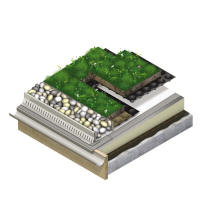| Green
roofing technology has now been simplified to enable specifiers to select
cost effective systems that deliver green good looks when it comes to
turning plans into reality. |
| Green
roofs are becoming an increasingly popular method of finishing flat or low
pitched roofs. |
| Apart
from looking good in both rural and urban environments, they provide
tangible benefits for owners of the building, for the environment and for
wildlife. |
| The
combination of plants and soil on the roof’s surface can substantially
increase the life expectancy of the roof’s waterproofing membrane by
protecting it from UV degradation and the extremes of climatic conditions.
|
|
Planting is a very effective method of insulation which reduces energy bills
and carbon dioxide emissions. It can also improve sound insulation by as
much as 8 dB compared with a conventional roof system and is particularly
valuable in areas of high noise pollution. |
| A
green roof reduces rainwater run off which helps to prevent localised
flooding and evaporation lowers the building’s temperature. Additional green
space and absorption of airborne pollutants provide a further boon for
nature. |
| Green
roof systems are no longer prohibitively expensive as a new generation of
modular systems has been developed specifically for large roofing areas.
|
|
Suitable for extensive and semi-extensive applications, they are made up of
0.5 metre square module trays. The substrate consists of egg-box shaped
cells, which overlap and slot together to provide a seamless finish and
provide plant drainage. |
| The
planting usually comprises sedum or a mix of sedum, wildflowers and natural
grasses that are indigenous to the locality. |
| The module trays
are pre-grown by a professional nursery over a three to nine-month period
and supplied as fully-established units which means the plants are strong,
robust and well anchored into the medium. |
 |
| Strong plants mean
less shock, less risk of wind uplift or erosion in those first few critical
months after installation. |
| The modules are
installed over a geotextile filter fabric, which sits on top of the
waterproofing. |
| The weight of the
system and the clever interlocking cells mean no fixings are required for
the modules, so the membrane stays watertight. |
| For
further information on SIG Design & Technology see
www.roofinfo.co.uk/sigdt |
| |